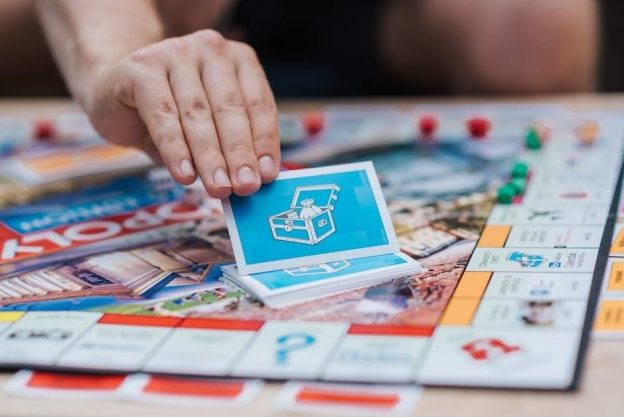Discover the official rules and strategies for the classic property-trading game. Learn setup‚ gameplay‚ and expert tips to master Monopoly and become the ultimate real estate tycoon.
1;1 Overview of the Game
Monopoly is a classic board game where players roll dice to move‚ buy‚ rent‚ and sell properties. The goal is to accumulate wealth and drive others to bankruptcy. Suitable for 2-6 players‚ it combines luck‚ strategy‚ and financial management. The game includes Chance and Community Chest cards‚ adding unpredictability. Families and friends can enjoy this timeless economics-themed game‚ requiring both skill and chance to win.
1.2 Importance of Understanding the Rules
Understanding Monopoly’s rules ensures smooth gameplay and fair competition. Knowing property management‚ rent collection‚ and auction processes prevents disputes. Familiarity with Chance and Community Chest cards‚ as well as the Speed Die option‚ enhances strategy. Adhering to official guidelines guarantees an enjoyable experience for all players‚ fostering a balanced and engaging game environment.
Setting Up the Game
Begin by placing the board in the center‚ shuffling and dealing Chance and Community Chest cards‚ and assigning a banker to manage finances and materials.
2.1 Unpacking the Components
Start by carefully unpacking the game box‚ which includes the game board‚ 28 property cards‚ 16 Chance cards‚ 16 Community Chest cards‚ 2 dice‚ 6 tokens‚ and play money. Ensure all items are accounted for before beginning setup to guarantee a smooth gaming experience for all players.
2.2 Preparing the Board
Place the Monopoly board in the center of the playing area‚ ensuring all spaces are face up and accessible. Position the Chance and Community Chest card spaces within easy reach. Designate the Free Parking space as the collection point for taxes and fines. Arrange tokens and dice nearby for quick access‚ and prepare the play money for distribution among players.
2.3 Distributing Materials to Players
Each player selects a token and places it on the “Go” space. Distribute $1‚500 in play money to each player‚ divided into denominations for easy access. Ensure each player receives a set of property cards corresponding to their purchases. Place unused tokens‚ houses‚ and hotels near the board for accessibility during gameplay. Shuffle and place Chance and Community Chest cards face down on their respective spaces.
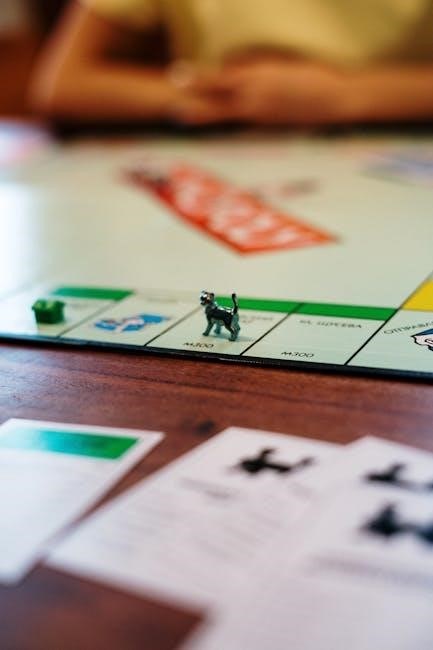
Gameplay Overview
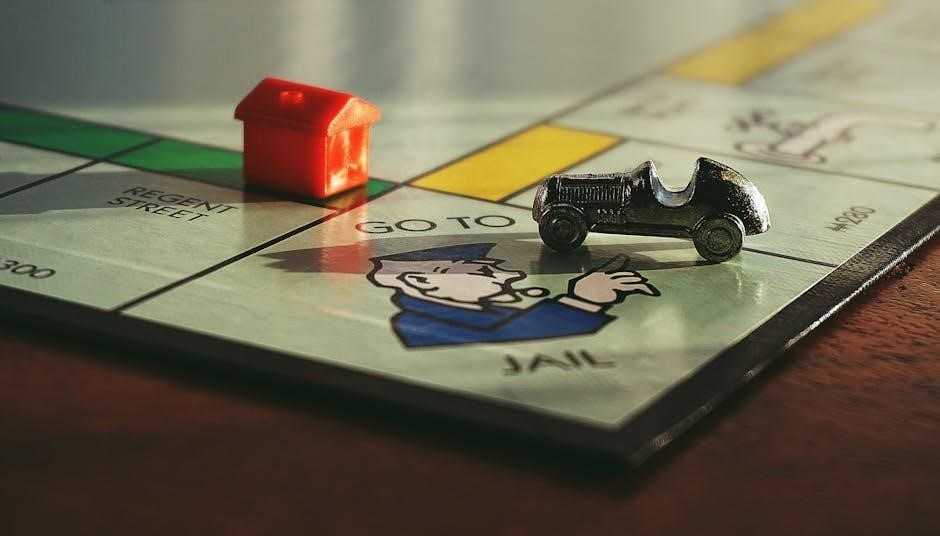
Master the Monopoly game flow‚ from rolling dice to strategic property management. Build houses‚ collect rent‚ and strategize with the Speed Die for faster gameplay.
3.1 Rolling the Dice and Moving
Players take turns rolling two dice‚ moving their token clockwise around the board by the total number shown. Start from GO and follow the dice count. Rolling doubles allows an extra roll after moving. The game begins with one player rolling to determine the first mover. Each move must be exact; landing on a space determines actions like buying property or paying rent.
3.2 Purchasing Properties
When a player lands on an unowned property‚ they may purchase it for the listed price on the board. Owning all properties in a color group grants a monopoly‚ allowing the collection of higher rents. Properties can be bought at auction if a player declines to purchase. Each property’s cost is indicated on its respective space.
3.3 Building Houses and Hotels
Players can build houses and hotels on owned properties to increase rental income. Houses can be built evenly across all properties in a color group‚ with each house raising the rent. Hotels follow the same rule and represent the highest rental value. Construction costs are outlined on the board‚ and building materials are limited‚ so players must manage resources wisely.
Chance and Community Chest Cards
Chance and Community Chest cards add unpredictability to the game‚ offering opportunities or challenges. Players must draw and follow the instructions‚ which can move pieces‚ collect funds‚ or impose penalties.
4.1 Understanding Card Types

Chance and Community Chest cards are integral to the game‚ offering opportunities or challenges. Chance cards feature individual actions‚ such as moving spaces or collecting funds‚ while Community Chest cards often involve paying or receiving money. Some cards benefit all players‚ like tax refunds. Each card provides clear instructions that must be followed immediately when drawn.
4.2 Resolving Card Actions
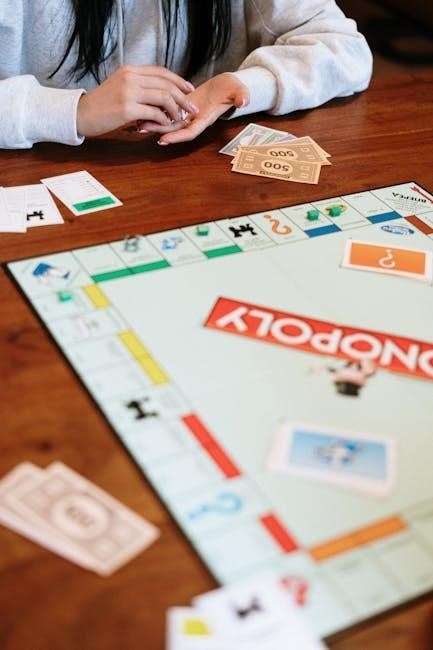
When a Chance or Community Chest card is drawn‚ the player must read it aloud and immediately follow the instructions. Actions may include moving spaces‚ collecting funds‚ paying taxes‚ or conducting tasks. Some cards benefit the player‚ while others may penalize them. All card instructions must be executed as directed to maintain fair gameplay and adhere to official rules.
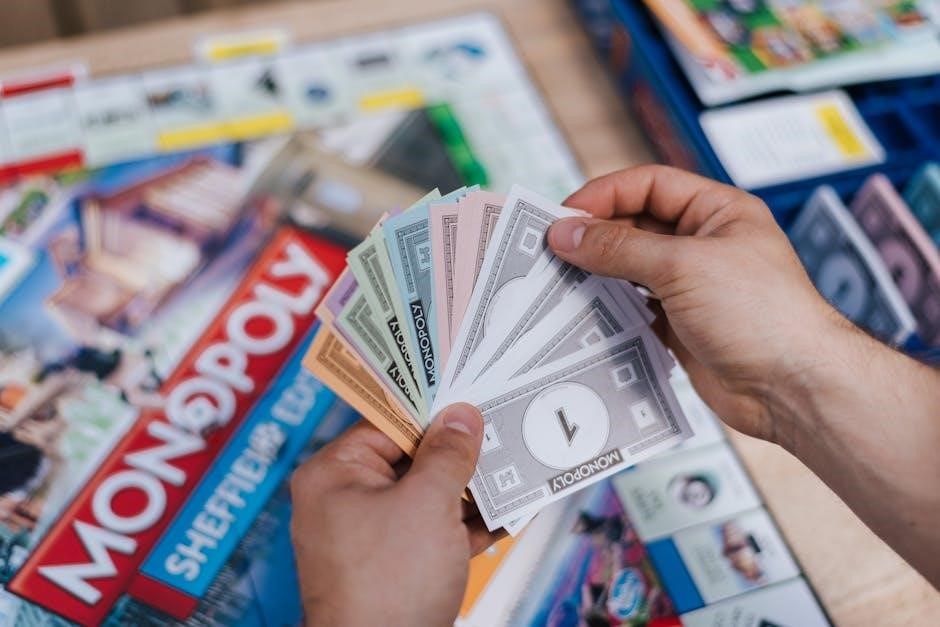
Paying Rent
Paying rent is a core aspect of Monopoly‚ occurring when a player lands on another’s property. The rent amount is specified on the property card‚ fostering strategic gameplay and financial depletion of opponents.
5.1 Rent Collection Rules
When a player lands on a property‚ they must pay the owner the listed rent. If the property has houses or hotels‚ the rent increases according to the building’s value. Payments are made immediately‚ and failure to pay results in bankruptcy. Rent collection is a key mechanic driving player elimination and strategic planning in Monopoly.
5.2 Special Cases for Rent
Certain spaces‚ like utilities and railroads‚ have fixed rent amounts. Rent doubles when a player owns all properties in a color group. If a property is mortgaged‚ no rent is owed. These special cases add depth to the game‚ rewarding strategic acquisitions and complicating financial decisions for players.
Ending the Game
The game concludes when one player acquires all others’ assets‚ eliminating them. The remaining player with the most valuable portfolio is declared the winner‚ ending the game officially.
6.1 Determining the Winner
The winner is the player who acquires all other players’ assets‚ eliminating them from the game. The remaining player with the most valuable portfolio‚ including cash and unmortgaged properties‚ is declared the winner‚ ending the game officially.
6.2 Finalizing the Game
Once a winner is determined‚ the game concludes with all assets transferred to the winner. Players tally their final cash and properties‚ and the winner is celebrated. The game board is then disassembled‚ and all components are stored for future play‚ ensuring everything is ready for the next round.
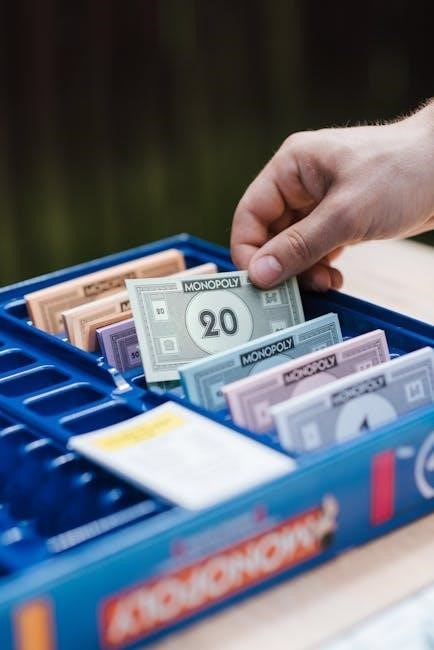
Additional Rules and Variations
Explore optional rules like the Speed Die for faster gameplay and the Free Parking Rule‚ which adds excitement and rewards. These variations enhance the classic experience.
7.1 Using the Speed Die
The Speed Die‚ an optional feature‚ accelerates gameplay by allowing players to move extra spaces or skip turns. Rolled alongside regular dice‚ it introduces a “speed” mechanic‚ enabling faster progression. If a 1 is rolled on the Speed Die‚ move double the number on the regular dice. This variation adds excitement and quickens the game’s pace for experienced players seeking a challenge.
7.2 Free Parking Rule
The Free Parking Rule allows players to collect all fines and taxes paid by others during the game. When a player lands on Free Parking‚ they receive the accumulated funds. Some house rules vary‚ but officially‚ Free Parking is a bonus space that rewards players with collected penalties‚ enhancing strategic gameplay and financial opportunities.
Auctions in Monopoly
Auctions occur when a player cannot afford to pay the full price for an unowned property. Other players bid‚ starting at $1‚ with the highest bidder winning the property.
8.1 When an Auction Occurs
An auction happens when a player lands on an unowned property but cannot afford to buy it. The bank then initiates bidding‚ starting at $1. All players‚ including the one who landed on the property‚ can participate. The highest bidder wins the property‚ paying the bank directly; This ensures properties are always acquired‚ keeping the game dynamic and competitive.
8.2 Bidding Rules

Bidding starts at $1 and increases by whole dollars. Players take turns raising the bid until only one remains. The highest bidder pays the bank directly. All bids are final‚ and the winner receives the property. If a player cannot pay‚ they are eliminated. Auctions ensure fair distribution of properties‚ adding excitement and strategy to the game.
Strategies for Winning
Mastering Monopoly requires strategic planning‚ smart negotiations‚ and wise property investments. Focus on acquiring high-value properties‚ building houses‚ and managing cash flow to maximize your chances of success.
9.1 Focus on Buying Specific Properties
Focus on acquiring high-value properties like orange and light blue groups‚ as they offer higher rental income. Prioritize buying over building initially to maximize cash flow. Use the Speed Die to accelerate gameplay and strategically negotiate trades to strengthen your portfolio. Always maintain enough cash to avoid debt and stay competitive.
9.2 Managing Cash Flow
Effective cash flow management is crucial for staying solvent. Keep enough funds for rent‚ taxes‚ and opportunities. Negotiate loans or trades if needed. Avoid unnecessary expenses like building hotels too early. Balance spending and saving to maintain liquidity‚ ensuring you can capitalize on future deals and withstand financial setbacks during gameplay.
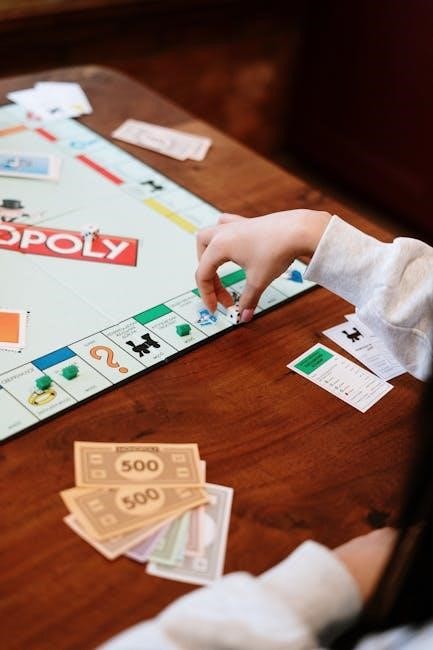
Downloading the Official Monopoly Game Instructions PDF

Access the official Monopoly rules and strategies by downloading the PDF from Hasbro’s website or trusted sources. Ensure authenticity by verifying the publisher and file details.
10.1 Sources for the Official PDF
The official Monopoly rules can be downloaded from Hasbro’s website‚ trusted PDF repositories like ManualsLib‚ or authorized game retailers. Additionally‚ platforms such as the official Monopoly site or board game forums provide verified links to ensure you have the most accurate and up-to-date instructions for optimal gameplay experience.
10.2 Ensuring Authenticity
To ensure you have the authentic Monopoly Game Instructions PDF‚ download it directly from Hasbro’s official website or trusted sources like ManualsLib. Verify the document by checking for the official Hasbro trademark and the game’s publication date. Avoid unofficial sources to prevent downloading modified or counterfeit versions of the rulebook.
Mastering Monopoly requires understanding its rules and strategies. By following the official guide‚ you’ll enhance your gameplay and enjoy countless hours of fun with family and friends.
11.1 Recap of Key Rules
Monopoly revolves around buying‚ selling‚ and trading properties. Players roll dice to move‚ collect rent‚ and draw Chance or Community Chest cards. The goal is to bankrupt others while building wealth. Understanding setup‚ gameplay‚ and strategies is essential for success. Adhering to official rules ensures a fair and enjoyable experience for all players.
11.2 Encouragement to Play
Embark on the timeless adventure of Monopoly‚ where strategy meets fun. Whether with family or friends‚ the game promises laughter‚ excitement‚ and a chance to sharpen your business skills. Dive into the world of real estate‚ roll the dice‚ and experience the thrill of building your empire. Play Monopoly and create lasting memories!
